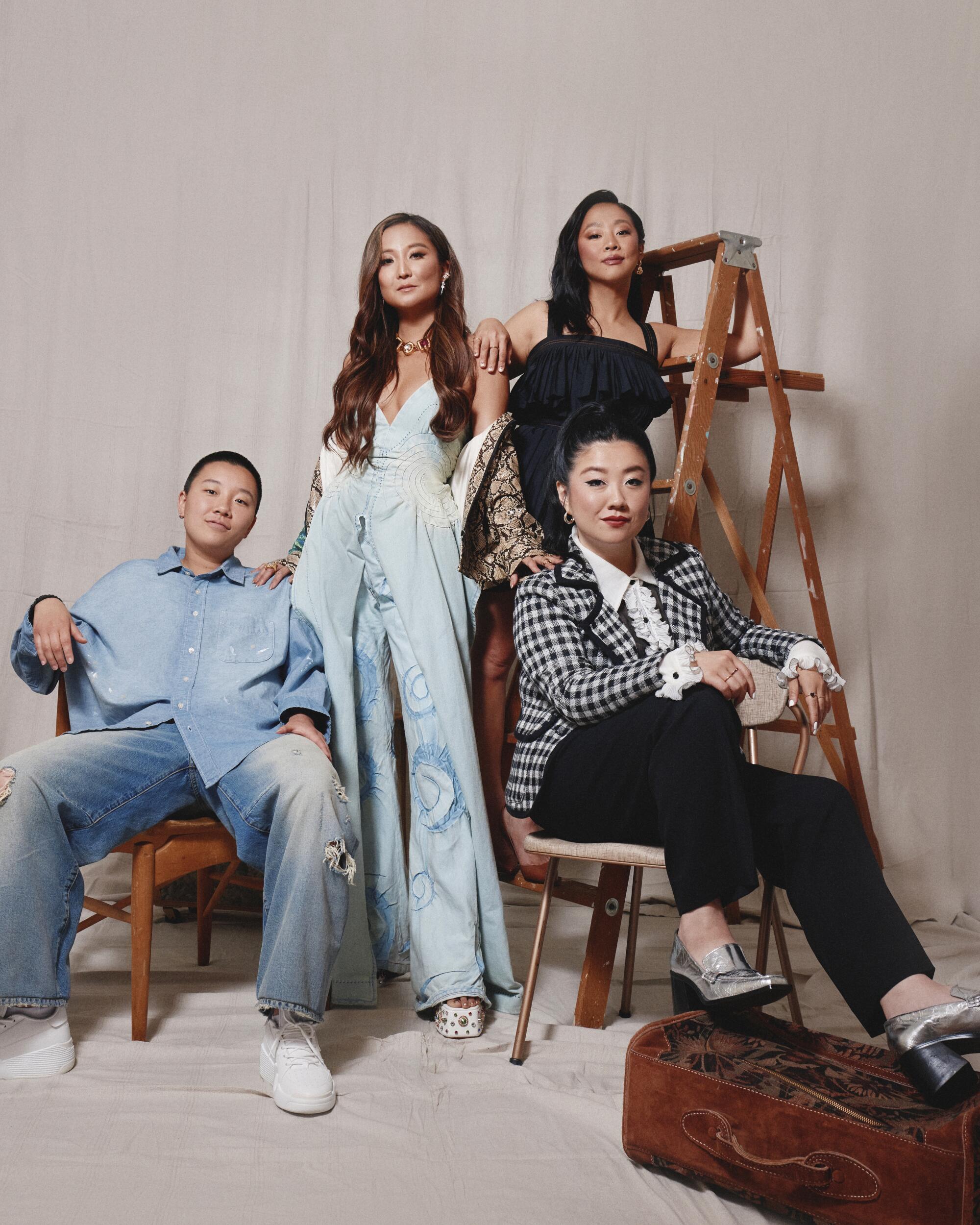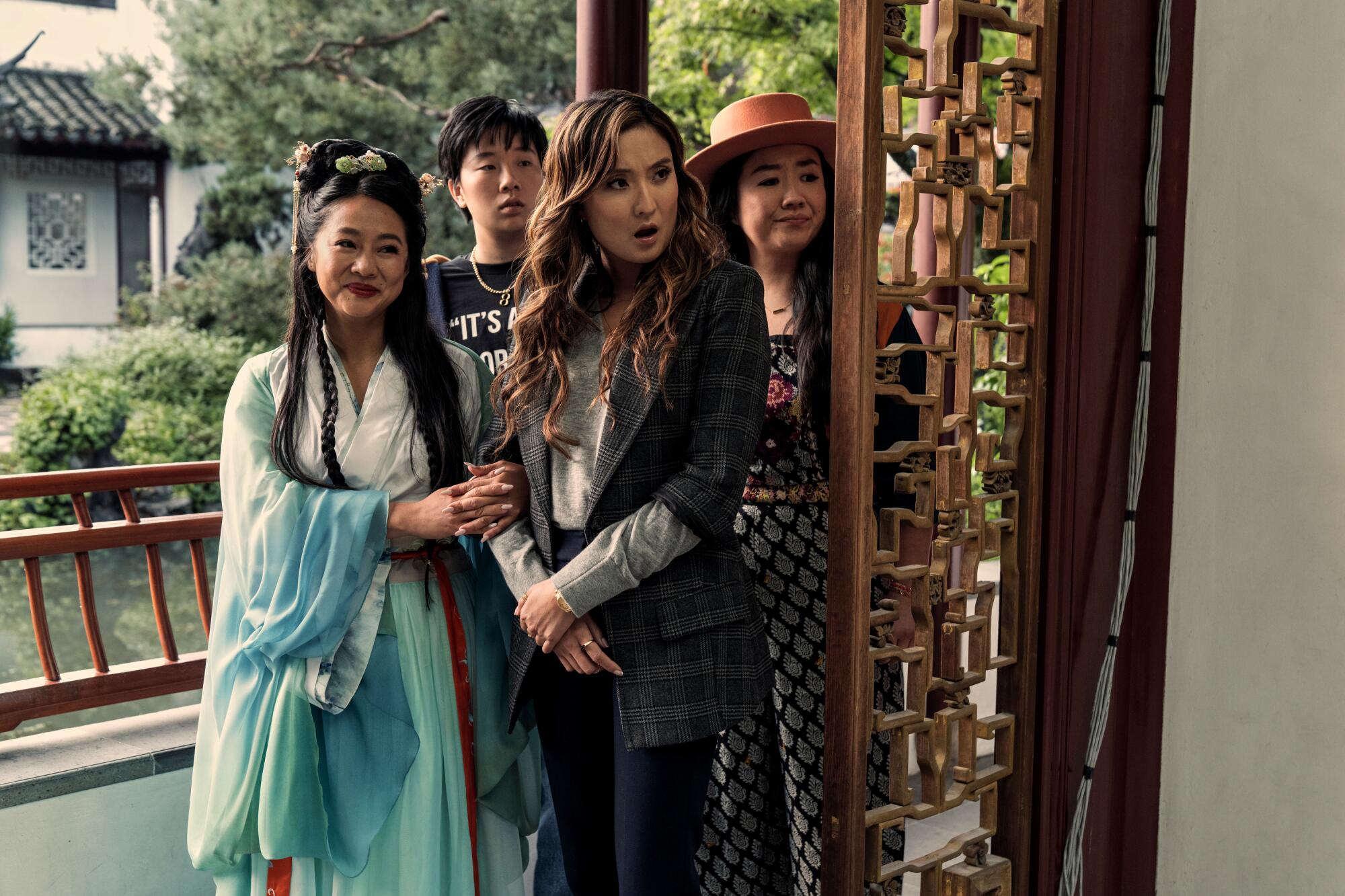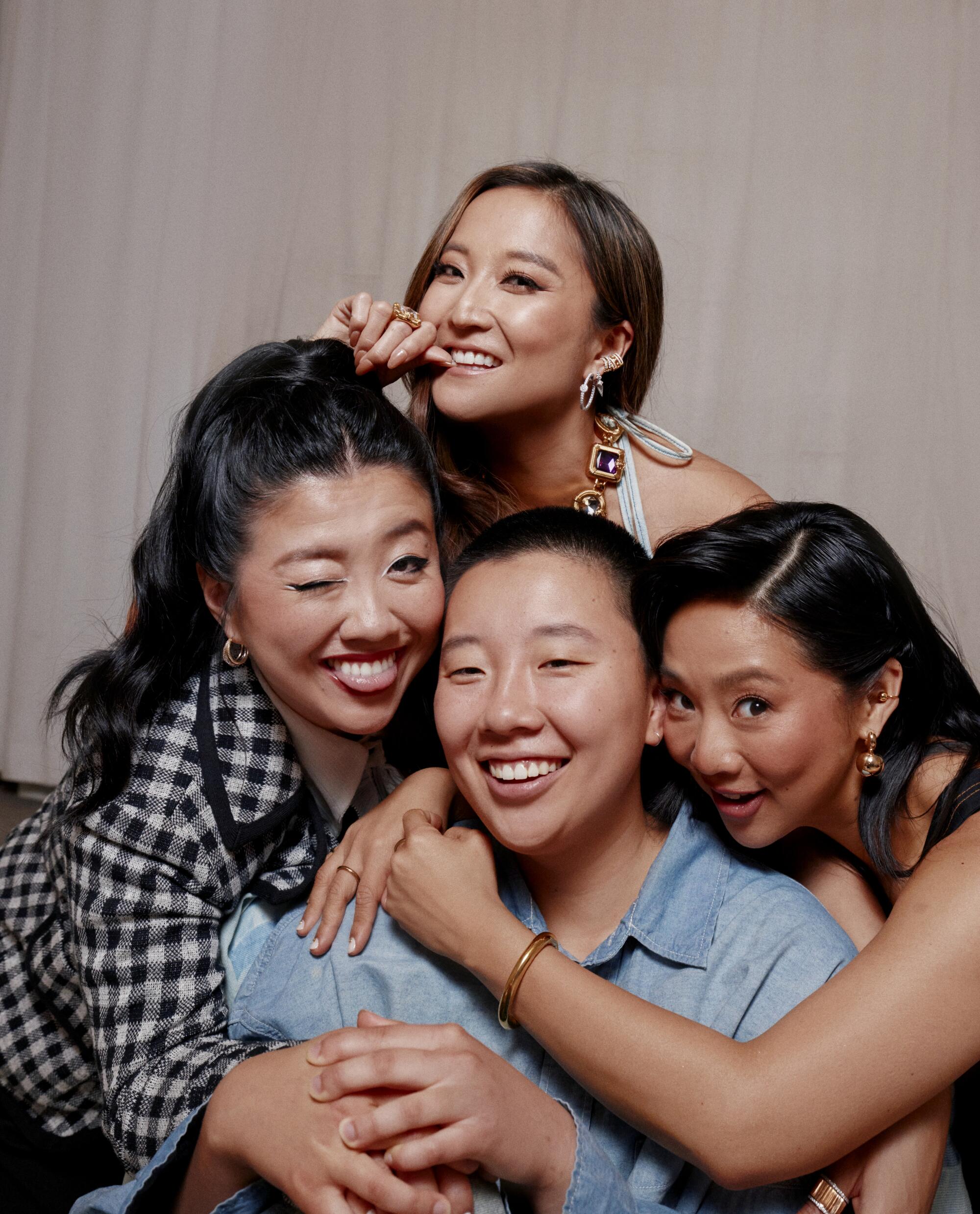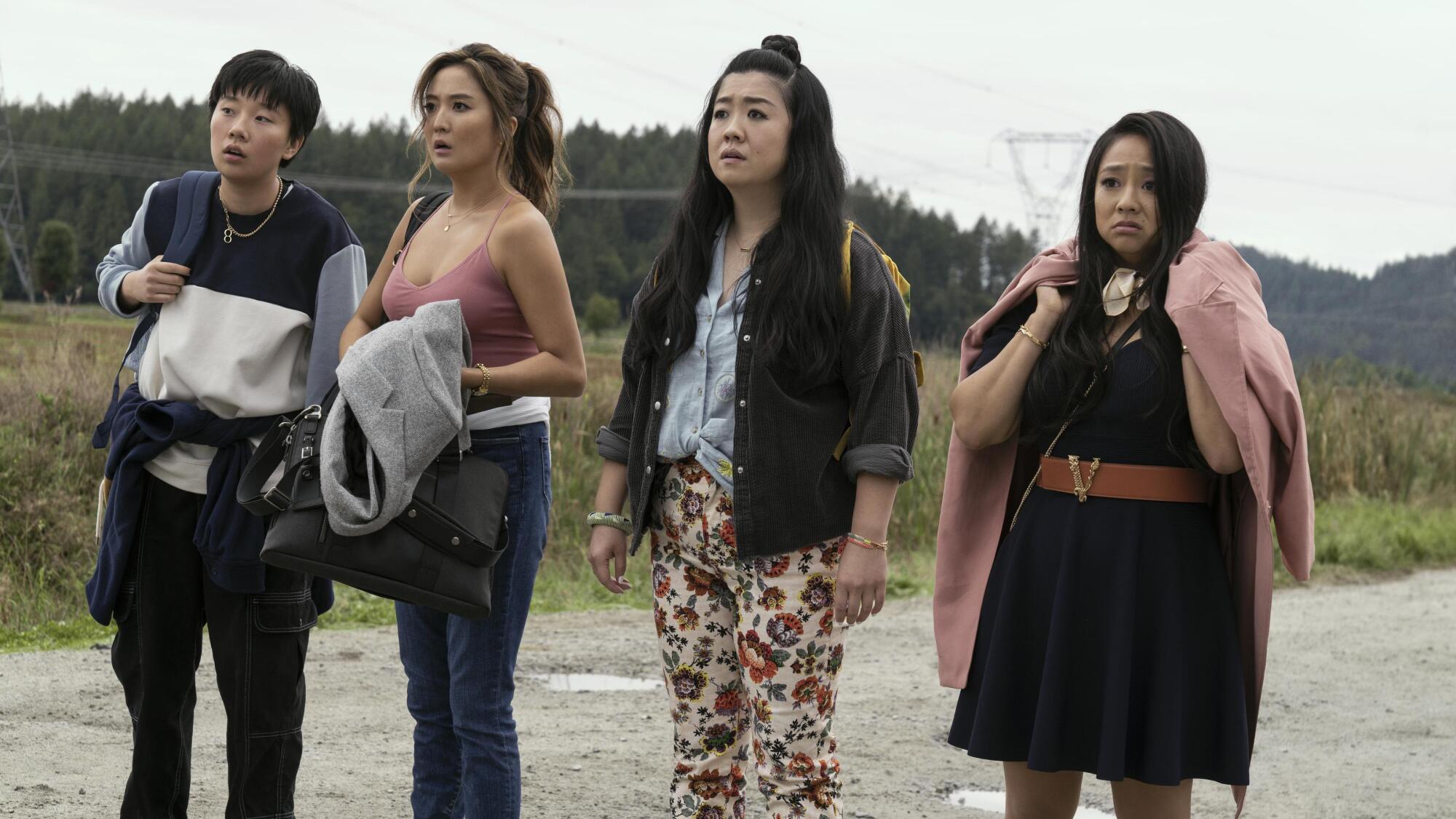
From the moment actors Ashley Park (“Emily in Paris”), Sherry Cola (“Good Trouble”), Oscar nominee Stephanie Hsu (“Everything Everywhere All at Once”) and newcomer Sabrina Wu read the script that would become “Joy Ride,” a hard-R studio comedy starring Asian American leads, the working title said it all: “Joy F— Club.”
“I knew that it would be this raunchy, over-the-top comedy, but then the heart started coming in and I was blown away by how invested I was in these characters and their friendships,” said Park, who stars as Audrey, an adoptee and lawyer whose work trip sparks a spur-of-the-moment adventure across China with her BFF Lolo (Cola), an artist stuck in arrested development; her college roommate-turned-soap-star pal Kat (Hsu), who’s hiding her sexual history from her devoutly Christian fiancé; and Lolo’s socially awkward cousin, Deadeye (Wu), whose only friends are on the internet.
Ashley Park, Sherry Cola, Sabrina Wu and “Everything Everywhere All at Once” breakout Stephanie Hsu play traveling companions in a China-set comedy that balances raunchy humor with cultural specificity.
Sex, copious drug consumption and a K-pop cover of Cardi B and Megan Thee Stallion’s “WAP” ensue as the quartet embarks on an unlucky side journey to find Audrey’s birth mother that deepens friendships and tests their bonds. The film allows its Asian American characters to be messy and multilayered in a way Hollywood films rarely do while exploring different dimensions, complexities and truisms of the Asian American experience (and serving up a robust offering of male eye candy through its decidedly female, and ravenous, gaze).
“We never get to do so much in one movie,” said Cola as the cast Zoomed in from a Miami press stop. “It was cool to play these characters who were figuring it out in some way, insecure in some way, and making mistakes. It’s so human, the story that we’re trying to tell, and it happens to also be this wild adventure. We’re tricking people into thinking deeply — with boob jokes.”

We’re tricking people into thinking deeply — with boob jokes.
— “Joy Ride” star Sherry Cola
In the grand tradition of “The Hangover” movies, “Bridesmaids” and “Girls Trip,” “Joy Ride” takes the bawdy buddy comedy genre for an inclusive and sex-positive spin. But it is also notably the first studio comedy to be written and directed by Asian women and center Asian American women and nonbinary stars.
For most of the main cast, it marks their first leading role in a major studio project — and like “The Joy Luck Club” and “Crazy Rich Asians,” it arrives with the eyes of the industry and AAPI community tracking its success. “There’s pressure,” said Park. “But there’s such relief in knowing I never have to explain this, because we all come from a certain perspective and understanding.”
“The dimension and the depth and the prism of experience comes out of us being pent up — like, ‘We have a lot to say, still!’” said Hsu.
Inspired by their own friends, “Joy Ride” is written by Cherry Chevapravatdumrong (“Family Guy”) and Teresa Hsiao (“Awkwafina Is Nora From Queens”), adapting a story they wrote with “Crazy Rich Asians” screenwriter Adele Lim, who makes her directorial debut. All three also produced the Lionsgate release (in theaters now), alongside R-rated comedy veterans Seth Rogen and Evan Goldberg.
Ahead of the movie’s nationwide release, Park, Cola, Hsu and Wu dove into the surprises of the script, how their R-rated antics are a reclamation after decades of stereotyping, and why a memorably NSFW tattoo could help start important conversations about acceptance in Asian American households.
“This movie is going to open up so many opportunities for Asian people to get tattoos,” said Wu. “Because they’ll be like, ‘Well, it’s not that one.’”

The writers set out to write an R-rated sex comedy, and they delivered. Reading the script and seeing what your characters were going to experience, what were your initial reactions?
Ashley Park: I was, first of all, so excited. The original title was “Joy F— Club” and just from that I thought, “Whoa, this is going to turn everything on its head.” I was a fan of Adele and Cherry and Teresa’s work individually, and just reading it I was so happy that not only was it a great Asian comedy script but it was the best comedy script I’d read in so long. I was really just happy that the movie was happening at all. It was a movie that I already wanted to go see.
Initially when I read the script, I cried. I was surprised as to why I was fully sobbing. I think now it was very cathartic to have the creators of this, Cherry, Teresa and Adele, having experienced feelings of finding yourself and reconciling your relationships, parental, generational, racial — all these different parts of yourself.
Sherry Cola: There was so much trust there because we all had such similar experiences. We were given permission to just be ourselves and play and find a lot of magic in the heat of the moment. So I’m honored that we get to be part of this first-of-its-kind, R-rated film that happens to have Asian faces but will touch so many lives because it’s so universal about friendship and discovering who you are.
Sabrina Wu: When I first read it, I was mostly a stand-up and a writer, so I thought, “Well, whoever gets it is going to have a really good time. It most likely will not be me.” It felt familiar in a good way and it reminded me of “The Hangover” and “Bridesmaids,” movies that were iconic but at the same time felt fresh. Yeah, we explore racism in America. But we also explore what it is like to be an Asian American in Asia. I felt right away that this could be really huge.
The original title was “Joy F— Club” and just from that I thought, “Whoa! This is going to turn everything on its head.”
— “Joy Ride” star Ashley Park
Stephanie, you filmed this after shooting “Everything Everywhere All at Once” but before it came out and went on to win Oscars. Did you feel like you related to the character?
Stephanie Hsu: I remember calling my agent and having this profound feeling of, “I can’t do this — this soap-opera movie star is not what I perceive myself to be.” So it was a journey for me to find my way into the character and make it funny and make it my own. It’s ironic now in hindsight, but I feel really grateful for Kat in a lot of ways because I think that she is so unhinged, and she loves performing and loves celebrity and stardom in a way that I really don’t. It was really fun to pull that thread far in one direction and to also find compassion for a person who genuinely wants to keep up their appearances because their line of work depends on it.
And between the four of you, your characters offer different dimensions on the Asian American experience.
Hsu: Even within the Asian American community there are tropes and stereotypes, and we break them even further — even within our own communities, saying, “We’re so much more than even just these lanes that have existed.”
Cola: The four of us prove that we are not a monolith, and it’s so special that all of us shine in the film. We share the love and grow from beginning to end, and have character arcs, which is so rare. Because typically we enter as the token Asian person, to be a device, to be the punchline or to serve someone else. But the four of us coexist in this film as proper leads.

For a long time my sister was terrified of telling our parents that she got the tiniest tattoo. The moment in the film where Kat reveals a very NSFW tattoo on an intimate body part promises to start some important conversations in Asian American families.
Wu: This movie is going to open up so many opportunities for Asian people to get tattoos. Because they’ll be like, “Well, it’s not that one.”
Hsu: You’re welcome, Asian community.
Stephanie, how closely did you work with Adele on the scene in which Kat reveals the tattoo in question?
Hsu: First and foremost, it is a body double, she’s amazing, and yes, I was involved in the process of casting her. Ultimately — and this is why I love our movie — it is sex-positive and body-positive, and of course it’s funny but that is also just a piece of anatomy with a wild image on it. That was the mission of the film in a lot of ways, and also why we got the blessing of Cardi B and Megan Thee Stallion to do “WAP,” because we had all these stereotypes that we wanted to reclaim and flip on their heads.
I will say that when I saw the edit [of that scene], I did not feel comfortable. I thought that the way that it was cut made me feel like people were laughing at Kat as opposed to laughing with Kat and the core four. So [the filmmakers] invited me into the editing process. We had five different versions of the moment the tattoo would reveal — it would reveal on different words, it would cut to different audience reactions — and we just sat there and figured it out.
Because it was important to us that it wasn’t just for shock value, that it was also hilarious and surprising and didn’t linger on it so long that it would alienate everybody but would open up more empathy for the friendship and for the character. For the record, I do feel really proud of how that beat now lands. I think it’s super empowering and great for the body double. She’s super awesome and sex-positive and confident, and that’s something I couldn’t do if that image was on my body.
It was important to us that it wasn’t just for shock value.
— Stephanie Hsu on Kat’s body-positive tattoo reveal
How much is even saying yes to a movie like this a trust exercise, and also freeing? To play a story that Asian women and nonbinary actors pretty much never get to play?
Cola: I think we knew how special this project was. I’ve never been the lead of any movie. So when we step on a set, how could we not just go for it, 150%? When will we get this opportunity again?
Park: Growing up I would watch movies that had R-rated scenes and I always thought, oh, I’ll never have to do an intimacy scene because nobody is putting me in that [role]. I don’t think I would have been as comfortable if we didn’t have the leadership that we had, feeling like I was being taken care of, that I’m not just here as a prop or as the butt of a joke. For me, I had to really shift my view of myself and of Asians as the protagonists in this story, and it was very helpful that we all had each other to go through that process.
Hsu: We were able to take those big swings because Cherry, Teresa and Adele are three Asian women who were going to protect us and made it their mission to make sure that the jokes were hitting hard while still in celebration of us. And shout-out to [Rogen and Goldberg’s producing company] Point Grey, who were our deepest allies. They did a beautiful job in giving space to Adele, Cherry and Teresa, to let them be as culturally specific as possible and to protect that space.
Wu: There was so much gratitude that this project got as far as it did. [The filmmakers] were so not territorial with the characters and the jokes. If you wanted to change a scene they were like, “Totally. We’re so grateful for you.” And I felt that on the flip side, as a comedian who didn’t think that I would ever get to act.
Korean American actor Edward Hong has played characters in dozens of TV shows and movies over the years, including as “Math Olympian Dude,” “Chinese Man #2” and, in a top-rated network sitcom, “Male Night Nurse.”
All four characters experience a duality in their identities, in the way they know the world sees them, and how they become empowered to show their true selves. Was that cathartic to explore?
Park: It was something we’ve observed other people get the opportunity to do, and I feel like we all had the qualities and experience and minds to do it. But you have muscle memory to not be able to do something sometimes, or not let yourself go there. The reason we love the characters, who are messy and flawed and chaotic, is that there’s room for them to have an arc. It was exciting to figure out how far we could go with the messiness in order to see how far they could grow.
Wu: A lot of people are surprised by the depth, and I think it speaks to how much more there is to say about being an Asian American. It’s like, “We’re trying to write a studio comedy and we’ve also touched on racism and we’ve also touched on feeling self-conscious and all these oblivious white people you have to deal with just to do your job.” I think we have so much to say that it’s coming out in a comedy that isn’t really even about that.

You have folks like NBA star Baron Davis filling out the movie around your characters. How did you bring these other players into the bond you created on set?
Hsu: Every single day people would get swallowed into our love. It would be like, “Come to dinner! Are you staying at that hotel? We’re going to go to Sherry’s!”
Cola: We were just so inclusive and so happy — Asian aunties who host. My mom is always like, “Come, eat, eat, eat!” and we were like that. And Baron was such a good sport, he caught everything I was throwing at him. It was just debauchery. I think all of the actors who popped in for a couple days felt that energy.
Wu: I was so starstruck that Meredith Hagner was there. I went to the bathroom and Googled “social anxiety.” It was like, “We are so happy to have you.” Big Nai Nai’s house energy.
Hsu: Shout-out to people who come and play. It felt like their “yes” was also to support us, to support this movement.
More to Read
Only good movies
Get the Indie Focus newsletter, Mark Olsen's weekly guide to the world of cinema.
You may occasionally receive promotional content from the Los Angeles Times.













